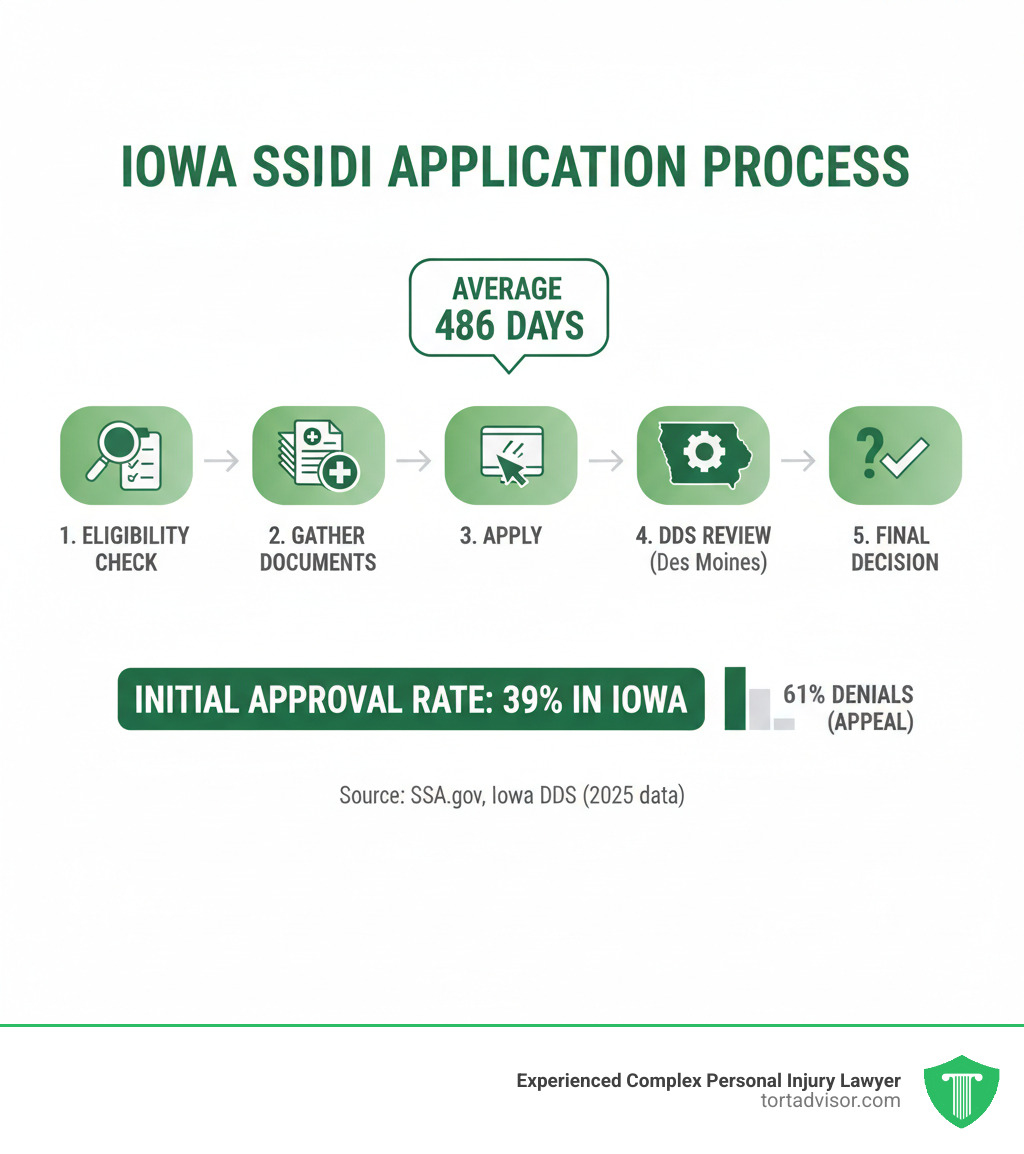


Understanding Social Security Disability Insurance in Iowa
How to claim social security disability insurance iowa involves a multi-step process that can feel overwhelming. Fortunately, Iowa residents have access to federal SSDI benefits and state-specific resources to help steer the system.
Quick Steps to Claim SSDI in Iowa:
- Check Eligibility: Ensure you have enough work credits and a qualifying medical condition.
- Gather Documents: Collect medical records, work history, and personal information.
- Apply: Use ssa.gov, call 1-800-772-1213, or visit a local SSA office.
- DDS Review: Your claim is sent to Iowa’s Disability Determination Services (DDS) for medical review.
- Wait for Decision: Average processing in Iowa is 235-293 days.
- Appeal if Denied: 61% of initial claims are denied, but appeals can succeed.
SSDI benefits are a vital lifeline for Iowans unable to work due to severe medical conditions. With 4.6% of Iowa’s population receiving SSDI, you’re not alone. The average monthly payment is $1,035.62. While you apply through the federal SSA, your claim is reviewed by Iowa’s DDS in Des Moines, which processes over 33,000 claims annually with a 97.9% accuracy rate.
I’m Mason Arnao, and my work in data management systems has given me unique insight into how government agencies evaluate SSDI applications. I’ve helped clients steer complex federal processes like how to claim social security disability insurance iowa through systematic documentation and understanding agency procedures.
Simple how to claim social security disability insurance iowa word guide:
- For disability claim assistance, visit tortadvisor.com/disability-claim-assistance/.
Understanding Your Eligibility for SSDI in Iowa
Before you learn how to claim social security disability insurance iowa, you must confirm you qualify. SSDI is an insurance program you’ve paid into through Social Security taxes. Eligibility depends on two key factors: your work history and your medical condition. Both must meet the SSA’s strict requirements for your claim to be approved.
| Feature | Social Security Disability Insurance (SSDI) | Supplemental Security Income (SSI) |
|---|---|---|
| Funding | Social Security taxes paid by you and your employers | General tax revenues (not Social Security taxes) |
| Eligibility | Based on work history (work credits) and a qualifying disability | Based on financial need (limited income and resources) and a qualifying disability, blindness, or age (65+) |
| Work History | Required | Not required |
| Medical | Must meet SSA’s definition of disability | Must meet SSA’s definition of disability (or be 65+/blind) |
| Benefit Amount | Varies based on lifetime average earnings | Standard federal benefit, supplemented by some states |
| Medicare | Generally eligible after 24 months of SSDI payments | Generally eligible for Medicaid |
| Average Payment in Iowa | $1,035.62 | $491.03 |
What Medical and Work History is Required?
The Social Security Administration uses a work credits system. In 2023, you earn one credit for every $1,640 in earnings, up to four per year. Most adults need 40 total credits, though younger workers may need fewer.
You must pass two work tests. The “Recent Work” test generally requires 20 credits earned in the 10 years before your disability began. The “Duration of Work” test examines your total lifetime credits.
Additionally, you cannot be engaged in Substantial Gainful Activity (SGA). For 2023, this means earning more than $1,470 per month (or $2,460 if you’re blind). If you earn above this limit, the SSA assumes you are not disabled.
Your medical condition must be a medically determinable impairment expected to last at least 12 continuous months or result in death. A short-term injury, like a broken leg that heals in six months, will not qualify. Chronic conditions like heart disease or severe mental health disorders often meet this duration requirement.
For more detailed information about the application process, visit the SSA’s comprehensive guide, “How To Apply For Social Security Disability Benefits,” at ssa.gov/disability/disability.html.
Qualifying Impairments and the Role of Age
The SSA maintains a Listing of Impairments, or “Blue Book,” which details conditions that qualify for benefits. It covers 14 major body systems, including musculoskeletal problems, mental health conditions, cardiovascular issues, and neurological disorders.
If your condition matches a Blue Book listing, your claim may be approved more quickly. However, the SSA also considers medical equivalence, where your condition is as severe as a listed impairment.
Your age can significantly impact your claim. The SSA’s “Grid Rules” acknowledge that it’s harder for older workers to adapt to new types of work. If you are 50 or older, the rules are more favorable. For workers under 50, you must generally prove you cannot perform even sedentary work.
The SSA also considers your education level and past work experience. Your Residual Functional Capacity (RFC), an assessment of what you can still do despite your limitations (e.g., how long you can stand, how much you can lift), is crucial. The RFC helps determine if there are any jobs in the national economy you could still perform.
Understanding these eligibility requirements is the first step in successfully navigating how to claim social security disability insurance iowa. Once you know where you stand, you can move forward with confidence in the application process.
How to Claim Social Security Disability Insurance Iowa: The Application Process
Once you confirm your eligibility, it’s time to apply. Preparing thoroughly will make the process smoother. I’ll walk you through how to claim social security disability insurance iowa step by step.
The SSA offers several application methods. The key to success is gathering all your documents before you start, which will save you frustration later. You can get started with your online application on the SSA website at ssa.gov/applyfordisability/index.htm.
Step 1: Gather Your Information and Documents
Before applying, gather all necessary documents to build a complete picture of your situation for the SSA.
Start with personal information: your Social Security Number, birth certificate, and proof of citizenship. If applicable, include information for your spouse and minor children. Have your bank account details ready for direct deposit.
Your medical evidence is the most critical part of your claim. List the names, addresses, and phone numbers for all doctors, hospitals, and clinics that have treated you, along with visit dates and tests performed. Gather your medical records, test results, and a complete list of medications. The Medical Release Form (SSA-827) is vital, as it authorizes the SSA to obtain records directly from your providers.
Your employment history should detail your jobs for the past 15 years, including your duties and why your condition prevents you from performing them. Collect recent W-2s or tax returns and information on any other disability benefits you’ve received.
Step 2: How to claim social security disability insurance iowa by Applying Online, by Phone, or In-Person
With your information organized, choose your application method.
Applying online is often the most convenient option. The portal allows you to work at your own pace, save your progress, and apply anytime. It guides you through each step of the process.
Applying by phone is ideal if you prefer speaking with a representative. Call the SSA at 1-800-772-1213 (TTY 1-800-325-0778). An agent can walk you through the application and answer your questions.
Applying in person offers face-to-face assistance, which can be helpful for complex cases. Use the Social Security Field Office locator tool, available at secure.ssa.gov/ICON/main.jsp, to find your nearest office and schedule an appointment to avoid long waits.
Regardless of the method you choose for how to claim social security disability insurance iowa, accuracy and completeness are essential. Double-check all information to ensure a smoother process.
What Happens After You Apply? The Iowa Determination Process
After you submit your application for how to claim social security disability insurance iowa, it enters a structured review process. Your case is sent from the federal Social Security Administration to a state agency that makes the medical eligibility decision. Understanding this process can help manage the anxiety of waiting.
The Role of Iowa’s Disability Determination Services (DDS)
While you apply through the federal SSA, the medical decision is made by Iowa’s Disability Determination Services (DDS). This state agency, located in Des Moines, processes over 33,000 claims annually with a 97.9% accuracy rate, indicating your case will be evaluated thoroughly.
A DDS disability examiner will gather your medical evidence by contacting the doctors, hospitals, and clinics you listed. They will request detailed records about your condition, treatment, and functional limitations. It is helpful if your doctors are aware of your application and provide complete records.
If more information is needed, DDS may schedule a Consultative Examination (CE). This is an independent medical exam paid for by Social Security to provide additional evidence. A medical consultant (a physician or psychologist) works with the examiner to review your case, ensuring both administrative and medical aspects are properly considered.
You can learn more about how Iowa’s DDS operates by visiting the Iowa Workforce Development website at workforce.iowa.gov/vr/career-planning-other-services/disability-determination-services.
How to claim social security disability insurance iowa: Tracking Your Application Status
The waiting period can be long, but the SSA provides tools to track your claim’s progress.
Creating a “my Social Security” account is essential. This free online portal allows you to check your application status, review benefit information, and manage your details. The status checker will show if your case is under initial review, with DDS for medical evaluation, or if a decision has been made.
You can check your application status directly on the SSA website at ssa.gov/myaccount/?URL=%2Fapps6z%2FIAPS%2FapplicationStatus.
Be prepared for a lengthy process. In Iowa, initial applications typically take 235 to 293 days (about eight to ten months). While the wait is difficult, approved benefits are often backdated to when your disability began, so you don’t lose out on payments. During this time, report any changes in your medical condition or treatment to DDS, as this new information could be crucial.
Navigating a Denial: The SSDI Appeals Process in Iowa
Receiving a denial letter is disheartening, but it is not the end of your claim. Most initial applications are denied—61% in Iowa. Understanding how to claim social security disability insurance iowa means knowing the appeals process, as many people win their benefits on appeal. The system has multiple levels of review because initial decisions are not always final.
The Four Levels of Appeal
You have 60 days from receiving a denial to file an appeal. This deadline is firm.
Level 1: Reconsideration. A different examiner and medical consultant at Iowa DDS will review your entire file, including any new evidence. Only 9% of reconsiderations are approved in Iowa, so another denial is common.
Level 2: Administrative Law Judge (ALJ) Hearing. This is your chance to present your case to a judge. You can testify about how your condition affects you and answer questions. This stage is much more successful; 55% of cases in Iowa are won at the hearing level. However, the wait for a hearing is about 15 months.
Level 3: Appeals Council Review. If the ALJ denies your claim, you can ask the Appeals Council to review the decision for legal or procedural errors. The Council can uphold the denial, reverse it, or send the case back for another hearing.
Level 4: Federal Court Action. The final step is to file a lawsuit in U.S. District Court. This is a complex legal action that requires an experienced attorney.
You can learn more about each step on the SSA’s website at ssa.gov/benefits/disability/appeal.html?tl=0.
Why Hiring a Disability Lawyer Increases Your Chances
The SSDI system is incredibly complex, and navigating it alone while managing a health condition is a significant challenge. A disability lawyer can dramatically increase your chances of success.
- Legal Expertise: Lawyers understand the thousands of pages of SSA regulations and how to apply them to your case.
- Strategic Evidence Gathering: They know what medical evidence is most persuasive and can work with your doctors to obtain reports that address specific SSA criteria.
- Hearing Representation: An attorney will prepare you for your ALJ hearing, present your case professionally, and cross-examine vocational and medical experts. This is crucial, given the high success rate at this stage.
- Higher Approval Rates: Statistics show that claimants with legal representation have a much higher chance of being approved, especially at the hearing level.
At Tort Advisor, we connect clients with top-rated attorneys specializing in SSDI Lawsuits. For more information, visit tortadvisor.com/tort/ssdi-lawsuits/. Most disability attorneys work on a contingency fee basis, meaning you only pay if you win your case, and their fees are capped by the SSA. This allows you to get expert help without upfront costs.
Frequently Asked Questions about Claiming SSDI in Iowa
When you’re dealing with a disability and trying to understand how to claim social security disability insurance iowa, it’s natural to have questions. Here are answers to some of the most common ones.
How much can I get in SSDI benefits in Iowa?
Your SSDI benefit is not a fixed amount; it’s calculated based on your average lifetime earnings from before your disability. The more you paid in Social Security taxes, the higher your benefit will be.
The average monthly SSDI payment in Iowa is $1,035.62, but your specific amount will depend on your earnings record. A family maximum benefit may apply, capping the total amount your family can receive on your record.
For an estimate, you can use online tools like our SSDI Settlement Calculator, available at tortadvisor.com/calculator/ssdi-settlement-calculator/.
How long does the entire SSDI process take in Iowa?
The SSDI process requires patience. Here is a realistic timeline for Iowa:
- Initial Application: 3 to 5 months (Iowa averages 235-293 days).
- Reconsideration: An additional 3 to 5 months if initially denied.
- ALJ Hearing: The longest wait, averaging 15 months in Iowa for a hearing date.
The entire process, from application to a hearing decision, can easily take two years or more. However, the SSA’s Compassionate Allowances program can fast-track claims for certain severe conditions, sometimes resulting in a decision in just a few weeks.
Can I work while applying for or receiving SSDI?
The rules around working can be confusing. Here’s a breakdown:
While Applying: You generally cannot earn more than the Substantial Gainful Activity (SGA) limit, which is $1,470 per month in 2023. Earning above this amount will likely lead to a denial.
Once Approved: The SSA has work incentives to help you return to work without immediately losing benefits.
- The Trial Work Period (TWP) allows you to earn any amount for nine months (not necessarily consecutive) while keeping your full SSDI benefit.
- After the TWP, a 36-month Extended Period of Eligibility (EPE) begins. During the EPE, you receive benefits for any month your earnings are below the SGA limit.
- The Ticket to Work program offers free employment support services.
Crucially, you must report all work and earnings to the SSA immediately. Failure to do so can result in overpayments that you must repay. The rules are complex, so consulting with the SSA or a disability attorney is wise if you plan to work.
Conclusion: Securing Your Future with the Right Support
Learning how to claim social security disability insurance iowa is a demanding journey, often taking over two years. However, it leads to crucial financial support.
While the initial denial rate in Iowa is high at 61%, persistence is key. Many claims are won on appeal, with a 55% approval rate at the Administrative Law Judge hearing stage. A complete, well-documented application is the foundation for success, but don’t be discouraged by a denial. The 60-day appeal deadline is critical; do not miss it.
Navigating the appeals process often requires expert legal guidance. An experienced attorney understands how to present medical evidence, prepare you for hearings, and handle the complex SSA rules, which can be the difference between approval and denial.
At Tort Advisor, we connect you with attorneys who specialize in SSDI Lawsuits. For more information, visit tortadvisor.com/tort/ssdi-lawsuits/. They know how to build a compelling case and advocate for your rights. Most work on a contingency fee basis, so you pay no upfront costs and only pay if you win. This allows you to access expert help during a financially difficult time.
You’ve earned these benefits through years of work. With the right support, you can steer this process and secure the financial stability you deserve. Take the next step with confidence by getting the right team on your side.
Free Confidential Case Evaluation
Complete the short form below to get an immediate FREE case review with an expert in your specific claim. Don't wait, your case could be time sensitive to file a claim.
Related Posts
Discover New Jersey disability benefits: TDI, FLI, SSDI, SSI rates, eligibility, applications & appeals for 2025-2026.
Hire a Depo-Provera lawsuit attorney now. Fight Pfizer for meningioma risks from injections. Free consult, MDL updates & settlements up to $1.5M.
Find top Miami florida car accident lawyers after your 305 crash. Get max compensation, navigate no-fault laws & choose the best experts now!
Diagnosed with cancer after Roundup? Learn about the monsanto roundup lawsuits, eligibility criteria, and how to pursue your claim.
Discover how do you qualify for a hair relaxer lawsuit: criteria, diagnoses, evidence & brands in uterine cancer MDL. Claim review now!
Find the best uber sexual assault lawsuit lawyer: expert guides, MDL experience, proven results & nationwide firms for justice.









